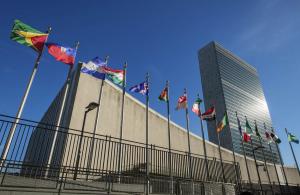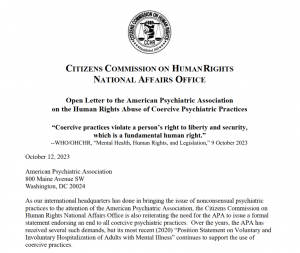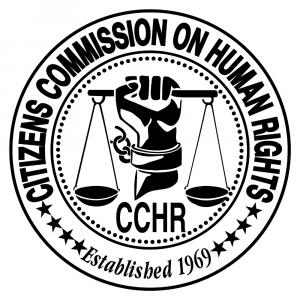Human Rights Group Demands American Psychiatric Association Cease its Support of Coercive Mental Health Practices

The World Health Organization and the United Nations Office of the High Commissioner for Human Rights (OHCHR) issued new guidance on ending human rights abuses and involuntary treatment in mental health services.
APA must act to eliminate coercive practices after UN bodies say involuntary mental health practices harm physical and mental health and must end.
The letter was delivered to Chief Executive Officer and Medical Director of the APA, Saul M. Levin.
The letter demands the APA immediately commit to the joint guidance issued October 9 by the World Health Organization (WHO) and the United Nations Office of the High Commissioner for Human Rights (OHCHR) to end human rights abuse, involuntary treatment and other coercive practices in the field of mental health.
The WHO/OHCHR guidance targets “human rights abuses and coercive practices in mental health care, supported by existing legislation and policies,” including “involuntary hospitalization and treatment, unsanitary living conditions and physical, psychological, and emotion abuse,” stating that these practices are far too common and “characterize many mental health services across the world.”
The guidance states: “A growing body of evidence sets out how coercive practices negatively impact physical and mental health, often compounding a person’s existing condition while alienating them from their support systems.” The guidance calls for legislation to “end coercion” and “enshrine free and informed consent as the basis of all mental-health related intervention.”
However, the APA’s “Position Statement on Voluntary and Involuntary Hospitalization of Adults with Mental Illness” continues to support coercive practices.
CCHR demands the APA repudiate involuntary hospitalization, involuntary medication, involuntary electroconvulsive therapy (ECT), and physical, chemical and mechanical restraint.
CCHR also referenced earlier guidance from WHO that coercive mental health treatment cease, including for those experiencing acute mental distress, pointing out that individuals in mental health crisis “are at a heightened risk of their human rights being violated, including through forced admissions and treatment….These practices have been shown to be harmful to people’s mental, emotional and physical health, sometimes leading to death.”
The mental health watchdog also insists that the APA endorse WHO/OHCHR’s position that those who commit human rights abuses in the name of mental health treatment should be brought to justice. The guidance states: “Accountability is an important component of the human rights framework.…Effective remedies also entail the duty to investigate and bring to justice those who are responsible, to hold them to account, combat impunity and prevent repetition of violations.”
The CCHR letter calls on the APA to issue “a formal statement in support of the elimination of the human rights abuse of coercive psychiatric practices and involuntary detentions” and to actively work to ensure this is done.
Citizens Commission on Human Rights was co-founded in 1969 by the Church of Scientology and the late psychiatrist and humanitarian Thomas Szasz, M.D., recognized by many academics as modern psychiatry’s most authoritative critic, to eradicate abuses and restore human rights and dignity to the field of mental health. CCHR has been instrumental in obtaining hundreds of laws securing patients’ rights against psychiatric abuse and violations of human rights worldwide.
The CCHR traveling exhibit, “Psychiatry: An Industry of Death,” educates the public on psychiatry’s history of abuse that continues to the present day and has toured major cities and venues on six continents, including at the Congressional Black Caucus Foundation Annual Legislative Conference.
Anne Goedeke
Citizens Commission on Human Rights, National Affairs Office
+1 202-349-9267
email us here
Visit us on social media:
Facebook
CCHR: 50 years of fighting for human rights (2019)
Legal Disclaimer:
EIN Presswire provides this news content "as is" without warranty of any kind. We do not accept any responsibility or liability for the accuracy, content, images, videos, licenses, completeness, legality, or reliability of the information contained in this article. If you have any complaints or copyright issues related to this article, kindly contact the author above.


